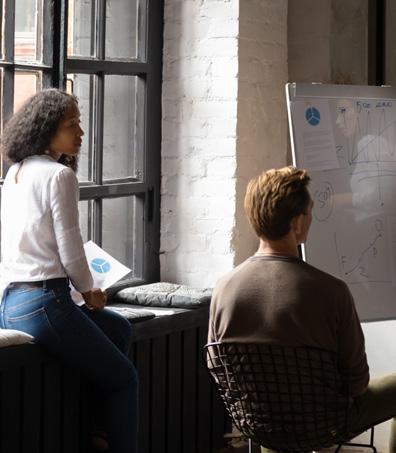
6 minute read
Tips To Coach Your Team To Success
Add these best practices to your coaching
Debbie De Grote, Co-Founder, Forward Coaching

Coaching is a remarkable tool with immense power for helping others discover new realms of possibility. As shared by Timothy Gallway, “Coaching is centered on unlocking a person’s potential to maximize his or her own performance and the development of skills.”
For leaders looking to amplify their team’s performance, coaching is KEY. Yet, before diving into how to be a great coach, let’s discuss what coaching is not. Coaching is not training, dealdoctoring, or sharing personal stories of how you did things.
Coaching is:
• Helping your team members find and achieve greatness within themselves to overcome any limiting beliefs.
• A two-way street. With everyone you coach, be wellprepared and give them your best. In return, they must be willing to show up, participate and do the work. You cannot be overly attached to the outcome; it’s up to the team member to do the work.
• Balancing candor with care. If you see something inhibiting the achievement of your team member’s goals, you must say something. Be relentless in getting them where they need to be.
As a coach, your job aspires to five achievements:
1. Inspire
2. Give hope
3. Help team members chart a course to pursue their dreams
4. Reveal blind spots
5. Help them master the fundamentals
Preparing For Your Coaching Sessions
Time is valuable; it’s imperative you make every coaching session.
Begin with being well-prepared:
• Block time for the meeting to ensure no interruptions or distractions
• Determine how you will meet (video chat or phone)
• Set up a coaching file for each person on your team in advance so you can easily review goals, numbers, personality assessments, and previous session notes/ action items
• Establish a system for scheduling, confirming and delivering post-session follow-up
Being well-prepared shows you are invested in the outcome. If you demonstrate you feel the session is important, they will likely follow suit.
It may take them longer to master the fundamentals and take action than you hoped it would, so keep finding new ways to bring them back to the actions and skills they must do and must master. Be relentless and realistic about their path to progress, that doesn’t mean, though, that you should buy into their stories and excuses.
Start Powerfully
When your session begins, avoid long anecdotes and idle chitchat. Instead, “build the bridge,” with a 15 to 30-second, “What was exciting about your week?” or “Of everything on your plate, what’s the most vital for us to discuss today?”
While your purpose and plan are important for the session, it’s equally important your team members get to share with you what’s on their minds and hearts. Because they may discuss personal life details, treat this as a confidential session. They must know they can trust you to be open and honest. If you feel you must convey information to others to help a team member grow, obtain their permission before sharing it with the appropriate people.
Asking Great Questions And Active Listening
Masterful coaches ask thoughtful questions, diving deep below the surface to uncover limiting beliefs, skill gaps, and other challenges their team members may be confronting. These obstacles aren’t always immediately brought to the surface. As you’re coaching, read between the lines and circle back to what must be overcome for them to succeed. A somewhat direct or confrontational question, while sometimes needed, can be softened with lead-ins such as, “I’m curious,” “May I ask,” or “Tell me…”
As you work through your session, ask clarifying questions; don’t be afraid to ask for additional information before you jump to giving advice. Be certain you really hear the questions they’re asking, too.

“The 7 Powers of Questions,” by Dorothy Leeds is a great resource I return to time and time again. The art of asking great questions doesn’t come naturally; it’s a skill you master. I also encourage you to write down three to five powerful questions before each coaching session. You may not get through them all, but they are great for fostering interactive coaching sessions. Some examples:
• “What are you avoiding that you know if you did it you would have great success?”
• “What is something I don’t know about what is going on with you, that if I did know I could help you more?”
• “What do you need from me to make this coaching process perfect for you?”
Feed Them With A Teaspoon
It’s a normal tendency for someone passionate about helping their team succeed to attempt too much in a single coaching session. We expect too much to happen, too fast. When you’re tempted to do so, remind yourself to feed with a teaspoon instead of a fire hose. Recognize the possibility that the more you assign your team member, the less they might accomplish.
Worst-case, they leave each session feeling overwhelmed and eventually give up.
Give them one key goal to achieve, with one or two additional small actions, and be certain they understand exactly what you expect of them. Ensure the action steps are crystal clear by asking, “How will you do it? When and where? What are the expected outcomes?” While tracking and measuring their numbers, keep them focused on achieving outcomes versus simply going through motions.
Always take detailed notes on your assignments to refer to in the next session for specified inquiries about their success in completion. Everyone loves recognition for a job well done! If they haven’t successfully accomplished the agreed-upon action, don’t ask, “Why not?”Why questions can be interpreted as confrontational and generally only yield excuses. Instead, try asking, “What got in the way?”
Don’t give up easily. Remind them you believe in them.
Focus On The Fundamentals
While any given coaching session could focus on myriad issues, no matter your students’ experience level, a focus on the fundamentals is always crucial.
Remind your coaching students, slumps are almost always caused by some breakdown in a fundamental aspect of their business. Drama and deals may make for more interesting conversation; however, mastering the basics really moves the needle of production.
Key areas to revisit frequently:
• Mindset
• Adhering to a schedule
• Fear of rejection
• Basic skills
• Discipline
• Buy-in and relationship commitment
Wrapping Up
As you wrap up your coaching session, strive for a strong finish. Summarize what the team member has committed to do and clarify that they understand their course of action. Leave them with a powerful thought, ideally one that rings in their head until your next session.

If you feel a session did not go as well as it should, follow up with a quick text or call just to ask, “Did you get what you needed from me in our time together?”
At the end of the week, look at the list of those you’ve coached to review what happened in each session, just in case there are additional follow-ups you need to accomplish.
Approaching Accountability
While good coaching encompasses accountability, it shouldn’t be a series of boxes to check off the list. “Did you do?” sessions bore both participants and don’t allow a deep dive into pertinent issues. Additionally, accountability shouldn’t be harsh or shaming; just be clear and direct, beginning with permission. When I ask someone’s permission to confront an issue, they almost always give it, allowing me to dig in and lay it on the line.
How you say something is as important as what you say. Strive for a tone of curiosity and discovery versus judgment. Review page 19 of the DISC assessment prior to meeting with them for the dos and don’ts of their preferred communication style. When you speak their language, they are more likely to listen — and take action. “Fierce Conversations,” by Susan Scott offers loads of helpful tips on confronting without drama.
Tips from Pro Coaches
PREPARE FOR A GREAT COACHING SESSION
“I have to be in a positive mindset and environment, without interruption. I like to start with asking a question, ‘What’s top-of-mind for you?’ ‘What’s the most important thing you want to make sure we cover today?’ Listen to what the client has to say and use their words in the conversation. I also review my notes and check the action items to see how they did.”
Mary Bakas, PLACE Operator of BKT Chicago West, Coach with Forward Coaching
One Of The Best Coaching Questions
“‘What’s the story you’re telling yourself in that situation?’ I like this question because it forces the other person to pause and really think about their reactions or the assumptions they are making. In that process, most people get into the logical side of a situation instead of the emotional side and they can generally come up with their own solutions.”









